Jaish-e-Mohammed (JeM)
(→Massod Azhar) |
(→Jaish-e-Muhammad and its founder) |
||
| (One intermediate revision by one user not shown) | |||
| Line 53: | Line 53: | ||
Former Pakistan President Pervez Musharraf on Wednesday said the Jaish-e-Muhammed was a terror outfit but indicated that his country’s intelligence had used it to carry out attacks in India during his tenure. Asked why he did not take action against the outfit during his tenure, Musharraf told Pakistani journalist Nadeem Malik that those times were “different”. Both India and Pakistan were involved in a clandestine struggle, “carrying out bombings in each other’s territory”, he claimed, adding that his country’s intelligence agencies were engaged in it. | Former Pakistan President Pervez Musharraf on Wednesday said the Jaish-e-Muhammed was a terror outfit but indicated that his country’s intelligence had used it to carry out attacks in India during his tenure. Asked why he did not take action against the outfit during his tenure, Musharraf told Pakistani journalist Nadeem Malik that those times were “different”. Both India and Pakistan were involved in a clandestine struggle, “carrying out bombings in each other’s territory”, he claimed, adding that his country’s intelligence agencies were engaged in it. | ||
| + | |||
| + | = Jaish-e-Muhammad and its founder= | ||
| + | ==A brief introduction== | ||
| + | [[File: Masood Azhar, a brief timeline.jpg|Jaish-e-Muhammad and its founder, A brief introduction <br/> From: [https://timesofindia.indiatimes.com/india/jem-chief-masood-azhar-designated-global-terrorist-what-made-china-relent/articleshow/69138402.cms May 2, 2019: ''The Times of India'']|frame|500px]] | ||
| + | |||
| + | [[File: Jaish-e-Muhammad’s terror trail.jpg|Jaish-e-Muhammad’s terror trail <br/> From: [https://epaper.timesgroup.com/Olive/ODN/TimesOfIndia/shared/ShowArticle.aspx?doc=TOIDEL%2F2019%2F05%2F02&entity=Ar01103&sk=50EE4BB7&mode=text Bharti Jain, May 2, 2019: ''The Times of India'']|frame|500px]] | ||
| + | |||
| + | [[File: Masood Azhar, A long history of death and destruction; why did China relent.jpg|Masood Azhar, A long history of death and destruction; why did China relent <br/> From: [https://epaper.timesgroup.com/Olive/ODN/TimesOfIndia/shared/ShowArticle.aspx?doc=TOIDEL/2019/05/02&entity=Ar00101&sk=15AA7407&mode=text Indrani Bagchi & Chidanand Rajghatta, May 2, 2019: ''The Times of India'']|frame|500px]] | ||
| + | |||
| + | '''See graphics''': | ||
| + | |||
| + | '' Masood Azhar, A long history of death and destruction; why did China relent '' | ||
| + | |||
| + | '' Jaish-e-Muhammad’s terror trail '' | ||
| + | |||
| + | '' Jaish-e-Muhammad and its founder, A brief introduction '' | ||
| + | |||
| + | ==2019/ Azhar declared global terrorist == | ||
| + | [https://epaper.timesgroup.com/Olive/ODN/TimesOfIndia/shared/ShowArticle.aspx?doc=TOIDEL%2F2019%2F05%2F02&entity=Ar00101&sk=15AA7407&mode=text Indrani Bagchi & Chidanand Rajghatta, May 2, 2019: ''The Times of India''] | ||
| + | |||
| + | |||
| + | Azhar declared global terrorist as China yields to int’l pressure | ||
| + | |||
| + | Jaish Chief To Face Travel Ban, Assets Freeze | ||
| + | |||
| + | New Delhi/Washington: | ||
| + | |||
| + | In a major diplomatic victory for India, China finally lifted its technical hold on Jaish-e-Muhammed leader Masood Azhar, a long-time terrorist proxy of Pakistan military and author of the Pulwama attack, being designated a “global terrorist” by the United Nations. | ||
| + | |||
| + | China relented after intense pressure from the US, UK and France and even smaller countries, including Indonesia, the most populous Islamic country in the world, which chaired the UN Sanctions Committee that formally made the designation, backing India, much to Pakistan’s embarrassment. India’s Permanent Representative to the UN, Syed Akbaruddin said, “Big, small, all join together. Masood Azhar designated as a terrorist in @UN Sanctions list. Grateful to all for their support.” | ||
| + | |||
| + | India has pursued the case against Azhar in the UN for a decade and MEA said Pakistan was “michievously” attempting to salvage a diplomatic embarrassment — a reference to Islamabad saying there is no reference to Pulwama. | ||
| + | |||
| + | “Pulwama happened to be the latest act of terror but the designation was not based on a specific incident but on the basis of evidence shared with the 1267 sanctions committee linking Azhar to terrorism,” the MEA said. | ||
| + | |||
| + | It was a moment to celebrate, given China’s consistent cover to its “all-weather ally” over Azhar and other terrorists who target India. Beijing bowed to international opinion after Jaish owned up to the Pulwama attack and India mounted a renewed effort to sanction Azhar. | ||
| + | |||
| + | For Islamabad, the ban on Azhar is a serious reverse, coming as it does after near total absence of any criticism of India’s air strikes on Balakot. The Trump administration fully backed New Delhi’s efforts to make China see reason. | ||
| + | |||
| + | |||
| + | ''' Pulwama left out as a concession ''' | ||
| + | |||
| + | The US, along with France and the UK, turned the heat on China in the UN security council, threatening to discuss Azhar in a forum that would isolate Beijing publicly and force it to state the reasons for opposing the ban. | ||
| + | “It has been a happy day, a good day for all those who would like to pursue the approach of zero tolerance for terrorism,” Akbaruddin said. The pendulum swung India’s way as its deepening strategic ties with France and the UK paid off. The advent of the Trump administration, for all its nitpicking with New Delhi over trade issues, has seen an unrelenting pursuit of a zero-tolerance terrorism policy. Eventually, it was Washington that took a hard line against Beijing. | ||
| + | |||
| + | Pakistan typically sought to give the humiliation at the UN a gloss by stating there is no reference to Pulwama and Kashmir, ignoring the fact that the case against the terror mastermind long predates the February incident. | ||
| + | In recent years, China has frustrated attempts to get Azhar sanctioned in 2016, 2017 and again in 2019 after the Pulwama attack. Azhar will be subject to assets freeze, travel ban and ar ms embargo. | ||
| + | |||
| + | The UN statement says Azhar has been placed on the sanctions list “for participating in the financing, planning, facilitating, preparing, or perpetrating of acts or activities by, in conjunction with, under the name of, on behalf of, or in support of”, ‘supplying, selling or transferring arms and related material to’, ‘recruiting for’, ‘otherwise supporting acts or activities of’, and ‘other acts or activities indicating association with Jaish-e-Mohammed.” JeM itself was listed on October 17, 2001. | ||
| + | |||
| + | Welcoming the designation, MEA spokesperson Raveesh Kumar said it was a “step in the right direction”. “This is in accordance with the information India has shared with the members of the Sanctions Committee regarding terrorist activities of Masood Azhar and the Jaish-e-Muhammed.” The lack of any mention Pulwama attack is seen as a concession to China though officials who negotiated pointed out that Beijing had blocked a ban in 2016 and 2017 as well. | ||
| + | |||
| + | The decision is the outcome of hectic negotiations between France, the UK, the US and China over the past month, with officials meeting in Beijing and New York to hammer out an agreement. | ||
| + | |||
| + | For Pakistan, the statement on Pulwama compromises the “integrity of the uprising”, and this was what China sought to paper over in Wednesday’s listing. During the negotiations, China insisted on Pulwama being kept out. However, diplomatic sources said that the entire move was in the context of the attack. “Everybody had to come out with something,” said diplomats directly involved with the negotiations. | ||
| + | |||
| + | [[Category:Crime|J JAISH-E-MOHAMMED (JEM) | ||
| + | JAISH-E-MOHAMMED (JEM)]] | ||
| + | [[Category:India|J JAISH-E-MOHAMMED (JEM) | ||
| + | JAISH-E-MOHAMMED (JEM)]] | ||
| + | [[Category:Pages with broken file links|JAISH-E-MOHAMMED (JEM)]] | ||
| + | [[Category:Pakistan|J JAISH-E-MOHAMMED (JEM) | ||
| + | JAISH-E-MOHAMMED (JEM)]] | ||
=Massod Azhar= | =Massod Azhar= | ||
Latest revision as of 20:28, 17 November 2020
This is a collection of articles archived for the excellence of their content. |
Contents |
[edit] Pakistan’s sword arm
[edit] 2016: ISI instigates two Jaish factions
The Times of India, May 27 2016
Behind ISI's renewed India terror offensive: Tale of 2 Jaish factions
Rajshekhar jha Investigations conducted by Indian intelligence agencies point towards a pattern linking a failed attack in Delhi in mid-December, the Pathankot attack on January 2 and the two attacks on the Indian consulate and mission in Afghanistan on January 3 and March 2, respectively.
All these strikes bear the stamp of two Jaish factions -Jaish-e-Mohammed (JeM) and Jaish ul Haq (JuH). TOI had reported on May 26 about Jaish's failed attack in Delhi in mid-December.
Sources say ISI has been pitting the two Jaish factions against each other and pressuring them into targeting Indian installations to prove their worth. While JeM is headed by Maulana Masood Azhar, JuH is led by Maualana Abdul Rehman (MAR). Both are connected to the IC-814 hijacking of 1999. Rehman orchestrated the hijack while Azhar was freed in exchange for passengers. According to an intelligence report, this approach is resulting in back-toback strikes. The theory is further nailed by the timing of the strikes, origin and background of operatives and their targets -all of whom are India-centric, sources say. The ploy to “divide and counterpoise“ is a time-tested ISI strategy, sources say, indicating that ISI was di rectly involved in the opera tions. Sources say the confes sion report of two Jaish ter rorists, Ahmed Khan Durra ni and Abdul Qadri, who were arrested by Kabul poli rested by Kabul poli ce in March, has opened a can of worms, revealing how Pakistan is pro viding both the Ja ish groups with in frastructure to run their training camps. The duo said they were trained at an ISI-operated trai ning camp in Bare Khyber Pankhutnkhwa.
There is a reason as to why Jaish is in focus after a long gap. At a time when mo vements of groups like Lash kar-e-Toiba and jihadist Ha feez Saeed are being watched closely, Jaish has proven to be ISI's trump card. As the ISI and Pakistan army escalated their attempts to target an Indian establishment outside J&K after PM Narendra Modi's Lahore stopover last year, the two factions of JeM emerged as a strategic choice for them.
While it is difficult for ISI to distance itself from LeT strikes, they are more comfortable doing so where Jaish is involved due to a lack of direct evidence connecting the two.
Jaish's revival is being considered dangerous for Delhi and other metro cities.Unlike the Lashkar and other outfits, Jaish's fidayeens are far more organised and more lethal. The Indian agencies are hoping they can nip in the bud the outfit's fresh attempts.
[edit] Pakistan’s main arm since 2017
Aarti Tikoo Singh, February 15, 2019: The Times of India
Masood Azhar’s Jaish-e-Mohammad continues to be Pakistan intelligence agency, ISI’s most favoured group for terror attacks in India, after Lashkar-e-Taiba made way for it two years ago.
Intelligence sources in Srinagar told the TOI that Jaish, which has been involved in suicide attacks in Kashmir since its launch in 2000, emerged as a stronger contender against Hafiz Saeed’s Lashkar-e-Taiba after the latter’s parent organization Jamaat-ud-Dawah announced to enter mainstream politics. Even as its political organization Milli Muslim League (MML) was denied the permission to contest, the Dawah fielded around 260 candidates under a different registered political party Allah-o-Akbar Tehreek in Pakistan’s 2018 assembly and general elections.
As a result, Pakistan's Inter-Services Intelligence (ISI), emboldened by China's repeated blockage of India's bid to designate Azhar a terrorist at the United Nations, decided to spend most of its resources on the Jaish. Last year, after China clearly told New Delhi that it was not going to blacklist him, Azhar issued a threat to the BJP government over Ram Mandir, saying that his men were ready to lay down their lives and burn down the temple if it was built.
Founder of Jaish, Azhar is mastermind of several deadly terrorist attacks in India, including the one on Uri military base in Kashmir in 2016 in which 17 security personnel were killed. Though he was detained for a while under ‘protective custody’ after the Pathankot terror attack, he has been freely and actively holding public rallies and organizing recruitment camps for the Jaish since 2016. In the early 90s, Azhar travelled in Middle East, Africa and the UK to raise funds for Islamist jihad in Kashmir and continues to have a massive following in Pakistan’s Punjab province.
Incidentally, Azhar, who was released by India in exchange for the passengers of the hijacked IC814 plane, unlike other chiefs of terror groups based in Pakistan (Hafiz Saeed and Syed Salahuddin), has committed his own family to the jihadist war in Kashmir. He has been sending several of his young nephews to recruit, train and organize terrorists in Kashmir and launch terror attacks.
It became apparent two years ago, when his nephew, Talha Rashid, was killed in an encounter with security forces in Pulwama. His another nephew Mohammad Usman was killed in a gun-battle in Tral. Usman was believed to have targeted and killed eight soldiers in over a dozen attacks. According to intelligence sources, Mohammed Umer, son of Azhar’s elder brother Ibrahim, also infiltrated into Jammu and Kashmir last year. NIA, in 2018, filed a chargesheet against Masood Azhar’s brother and Jaish’s deputy chief Maulana Abdul Rouf Asgar for planning the attack on an Army camp in Nagrota in November 2016.
Intelligence sources believe that the Pulwama suicide bombing on Thursday, is also a handiwork of Asgar.
[edit] Musharraf: Pak used JeM to target India
March 7, 2019: The Times of India
Former Pakistan President Pervez Musharraf on Wednesday said the Jaish-e-Muhammed was a terror outfit but indicated that his country’s intelligence had used it to carry out attacks in India during his tenure. Asked why he did not take action against the outfit during his tenure, Musharraf told Pakistani journalist Nadeem Malik that those times were “different”. Both India and Pakistan were involved in a clandestine struggle, “carrying out bombings in each other’s territory”, he claimed, adding that his country’s intelligence agencies were engaged in it.
[edit] Jaish-e-Muhammad and its founder
[edit] A brief introduction
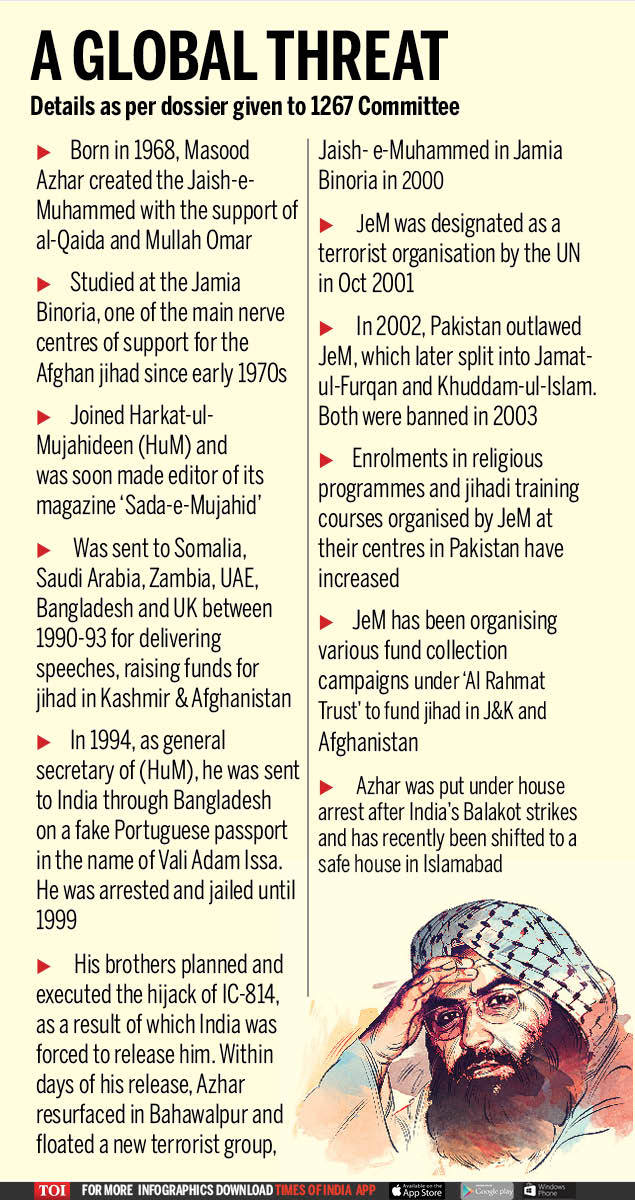
From: May 2, 2019: The Times of India
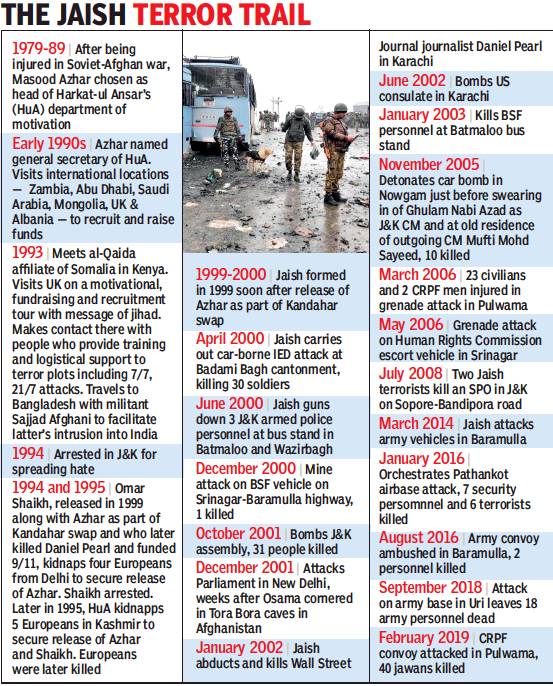
From: Bharti Jain, May 2, 2019: The Times of India
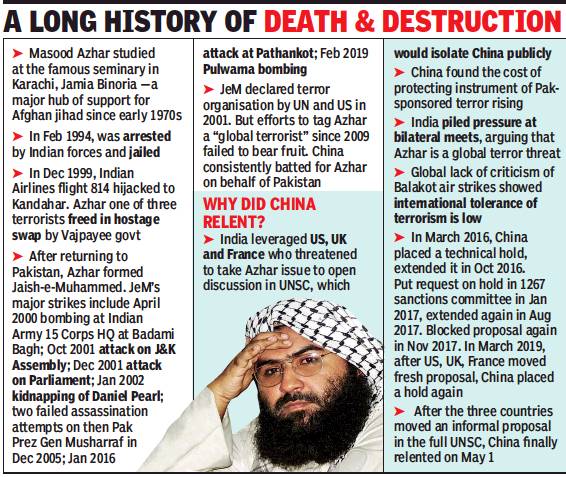
From: Indrani Bagchi & Chidanand Rajghatta, May 2, 2019: The Times of India
See graphics:
Masood Azhar, A long history of death and destruction; why did China relent
Jaish-e-Muhammad’s terror trail
Jaish-e-Muhammad and its founder, A brief introduction
[edit] 2019/ Azhar declared global terrorist
Indrani Bagchi & Chidanand Rajghatta, May 2, 2019: The Times of India
Azhar declared global terrorist as China yields to int’l pressure
Jaish Chief To Face Travel Ban, Assets Freeze
New Delhi/Washington:
In a major diplomatic victory for India, China finally lifted its technical hold on Jaish-e-Muhammed leader Masood Azhar, a long-time terrorist proxy of Pakistan military and author of the Pulwama attack, being designated a “global terrorist” by the United Nations.
China relented after intense pressure from the US, UK and France and even smaller countries, including Indonesia, the most populous Islamic country in the world, which chaired the UN Sanctions Committee that formally made the designation, backing India, much to Pakistan’s embarrassment. India’s Permanent Representative to the UN, Syed Akbaruddin said, “Big, small, all join together. Masood Azhar designated as a terrorist in @UN Sanctions list. Grateful to all for their support.”
India has pursued the case against Azhar in the UN for a decade and MEA said Pakistan was “michievously” attempting to salvage a diplomatic embarrassment — a reference to Islamabad saying there is no reference to Pulwama.
“Pulwama happened to be the latest act of terror but the designation was not based on a specific incident but on the basis of evidence shared with the 1267 sanctions committee linking Azhar to terrorism,” the MEA said.
It was a moment to celebrate, given China’s consistent cover to its “all-weather ally” over Azhar and other terrorists who target India. Beijing bowed to international opinion after Jaish owned up to the Pulwama attack and India mounted a renewed effort to sanction Azhar.
For Islamabad, the ban on Azhar is a serious reverse, coming as it does after near total absence of any criticism of India’s air strikes on Balakot. The Trump administration fully backed New Delhi’s efforts to make China see reason.
Pulwama left out as a concession
The US, along with France and the UK, turned the heat on China in the UN security council, threatening to discuss Azhar in a forum that would isolate Beijing publicly and force it to state the reasons for opposing the ban. “It has been a happy day, a good day for all those who would like to pursue the approach of zero tolerance for terrorism,” Akbaruddin said. The pendulum swung India’s way as its deepening strategic ties with France and the UK paid off. The advent of the Trump administration, for all its nitpicking with New Delhi over trade issues, has seen an unrelenting pursuit of a zero-tolerance terrorism policy. Eventually, it was Washington that took a hard line against Beijing.
Pakistan typically sought to give the humiliation at the UN a gloss by stating there is no reference to Pulwama and Kashmir, ignoring the fact that the case against the terror mastermind long predates the February incident. In recent years, China has frustrated attempts to get Azhar sanctioned in 2016, 2017 and again in 2019 after the Pulwama attack. Azhar will be subject to assets freeze, travel ban and ar ms embargo.
The UN statement says Azhar has been placed on the sanctions list “for participating in the financing, planning, facilitating, preparing, or perpetrating of acts or activities by, in conjunction with, under the name of, on behalf of, or in support of”, ‘supplying, selling or transferring arms and related material to’, ‘recruiting for’, ‘otherwise supporting acts or activities of’, and ‘other acts or activities indicating association with Jaish-e-Mohammed.” JeM itself was listed on October 17, 2001.
Welcoming the designation, MEA spokesperson Raveesh Kumar said it was a “step in the right direction”. “This is in accordance with the information India has shared with the members of the Sanctions Committee regarding terrorist activities of Masood Azhar and the Jaish-e-Muhammed.” The lack of any mention Pulwama attack is seen as a concession to China though officials who negotiated pointed out that Beijing had blocked a ban in 2016 and 2017 as well.
The decision is the outcome of hectic negotiations between France, the UK, the US and China over the past month, with officials meeting in Beijing and New York to hammer out an agreement.
For Pakistan, the statement on Pulwama compromises the “integrity of the uprising”, and this was what China sought to paper over in Wednesday’s listing. During the negotiations, China insisted on Pulwama being kept out. However, diplomatic sources said that the entire move was in the context of the attack. “Everybody had to come out with something,” said diplomats directly involved with the negotiations.
[edit] Massod Azhar
[edit] 1979-2019
Bharti Jain, Osama’s Friend Azhar A Global Threat, March 2, 2019: The Times of India
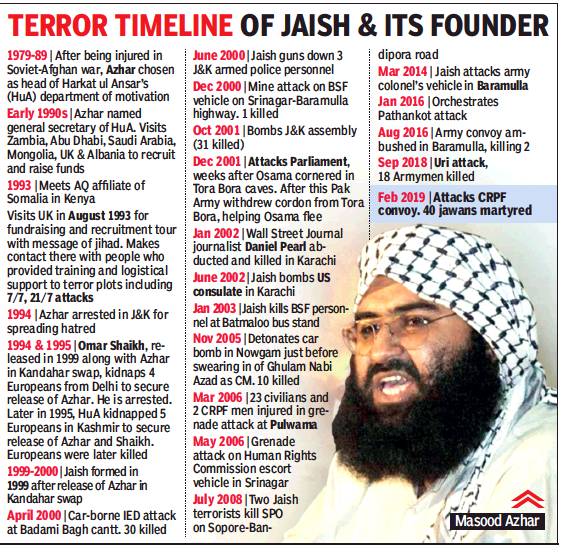
From: Bharti Jain, Osama’s Friend Azhar A Global Threat, March 2, 2019: The Times of India
Jaish Chief Helped Qaida Founder Flee Af Caves After 9/11
Jaish-e-Muhammed chief Maulana Masood Azhar, a known associate of al-Qaida founder Osama bin Laden, had helped the latter flee from Tora Bora caves in Afghanistan where he was cornered after the 9/11 attacks on the World Trade Center in 2011, at a time the Pakistan army had cordoned off one side of the vast cave network.
According to Indian intelligence sources, Jaish planned two major attacks in India in the immediate aftermath of the 9/11 attacks in the United States planned and executed by al-Qaida. First, on October 1, 2001, some three weeks after 9/11, Jaish bombed the Jammu & Kashmir assembly complex, killing 35 people. Two months later, on December 13, 2001 Jaish fidayeen carried out an audacious attack on India’s Parliament, which claimed nine lives.
A top intelligence official told that the two attacks heightened hostilities between India and Pakistan, leading to a war-like situation and provided the Pakistani army a “pretext” to withdraw much of its forces from its western border, which were cordoning the Tora Bora caves. This assisted Osama’s escape to Pakistan.
As a result, it took American forces 10 additional years to get hold of Osama. He was killed by the US Navy Seals on May 2, 2011, in a compound in Abbottabad, Pakistan.
“This is the nature of Jaish’s capability, and demonstrates that it is an organisation that does not just impact India, but feeds on pan-Islamism and has been a major threat to global peace and security,” an intelligence functionary told TOI.
Recent inputs suggest that Azhar is suffering from renal failure and requires regular dialysis at the army hospital in Rawalpindi.
Azhar, who founded Jaish soon after his release from an Indian prison as part of the IC-814 swap deal in 1999, reportedly worked closely with Osama in the 90s. As the top motivator of Harkat-ul-Ansar, he was used for jihadi indoctrination across various African countries.
After Azhar was freed in 1999, he was greeted in Kandahar by Mullah Mansoor, a senior representative of Taliban chief Mullah Omar. Mansoor later replaced Omar and was killed in a drone strike in 2016. On the night of Azhar’s release, Osama is known to have hosted a banquet for him.
Azhar is known to many as the Pakistani cleric who brought jihad into religious discourse in British mosques. He reportedly made contact with people who helped provide training and logistical support for terror plots of 7/7 and 21/7 attacks in London and the attempt in 2006 to smuggle liquid bombmaking substances on to transatlantic airlines.
One of his British recruits, Omar Shaikh, as a member of HuA, kidnapped four western tourists in Delhi in 1994 to get Azhar freed but security agencies succeeded in releasing the hostages and arresting Shaikh. He was released along with Azhar as part of the Kandahar swap, and later went on to abduct and kill journalist Daniel Pearl, apart from funding the 9/11 attacks.
[edit] 1989: training, 1994: India
Bharti Jain, Stout Azhar failed to complete terror training, March 15, 2019: The Times of India
Jaish-e-Mohammed chief Masood Azhar had stayed in Delhi’s luxury hotels, including Ashoka Hotel located in the vicinity of the diplomatic area, in early 1994 before he journeyed to Kashmir to brief militant leaders on the merger of Harkat-ul-Jihadi Islami (HuJI) and Harkat-ul-Mujahideen (HuM) into a new outfit called Harkat-ul-Ansar (HuA).
With a forged Portuguese passport issued in the name of Vali Adam Issa and a valid Indian visa, Azhar arrived at Indira Gandhi International Airport from Dhaka on a Bangladesh Airlines flight on January 29, 1994. When immigration officials pointed out that he did not look like a Portuguese, he got off by telling them he was of Gujarati origin. These disclosures were made by Azhar during his interrogation following his arrest in Anantnag on February 11, details of which have been accessed by TOI.
Azhar, who was then secretary general of HuA, took a taxi from the airport to Ashoka Hotel in Chanakyapuri, where he stayed that night. He later met Abu Mehmood, the ‘emir’ (Jammu) of HuA, and Ashraf Dar. Azhar and Dar later left for Deoband by car and stayed at Darul Uloom Deoband. The next morning, they left for Saharanpur and stayed at a mosque. On January 31, Azhar returned to Delhi and stayed at Janpath Hotel near Connaught Place.
Azhar arrived in Srinagar on February 9 and met Sajjad Afghani, with whom he would be arrested later, and HuJI deputy chief commander Amjad Bilal. They decided that Azhar would be taken to Kapran area the following morning to meet mujahids. However, as he was returning after meeting militants in Matigunj, he was arrested.
Azhar told interrogators that he came under the influence of HuM at Jamia Islamia, Karachi. In June 1989, he met HuM ‘emir’ (Karachi) Fazal-ul-Rehman Khalil and went for training in Afghanistan. Stoutly built, he could not complete the 40-day training and it was waived off.
Azhar visited many countries, including Zambia, where he collected Rs 44 lakh over two trips in 1991 and 1992. During a month-long visit to mosques in the UK in October 1992, he collected donations worth Rs 15 lakh.
Not many donations came from the UAE, where the system of donations is well-regulated, and he could raise only Rs 3 lakh. In Saudi Arabia, he was politely turned away as HuM owed allegiance to Jamiat-ulema-Islam whereas donations there mostly went to Jamiat-ul-Islah ally Jamaat-e-Islami, PoK. In Sharjah, Azhar’s efforts to collect donations did not meet success as it had good relations with India. However, due to influence of some maulanas, they could collect Rs 6 lakh.
[edit] A brief profile, as in 2016
The Times of India, Dec 20 2016
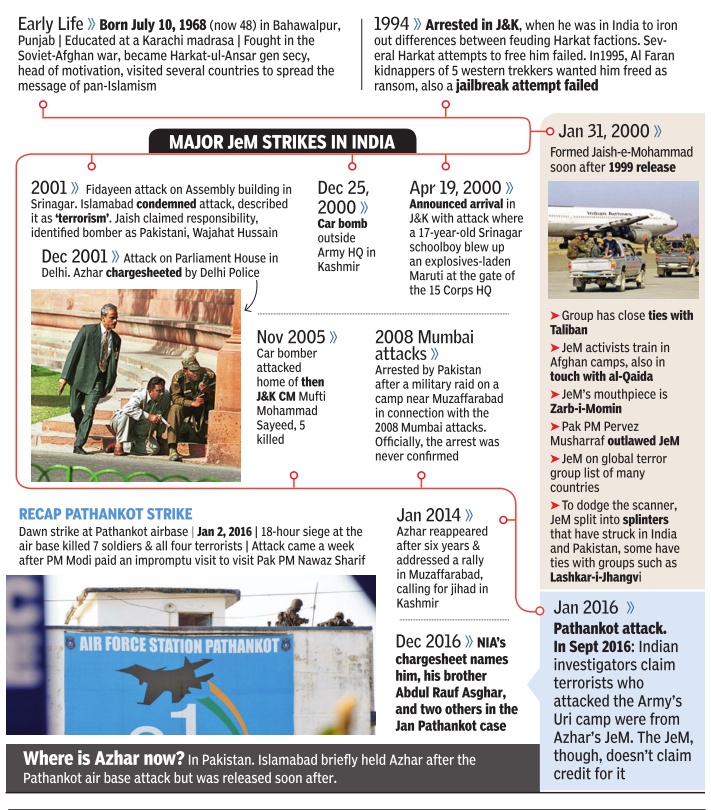
The National Investigation Agency's chargesheet against Jaish-e-Mohammad chief Masood Azhar comes days ahead of Dec 31, the day China's refusal to back India's move in the UN to get the terror kingpin declared a global terrorist, is set to lapse.Here's how Azhar -in Delhi's list of 50 most-wanted terrorists -masterminded attacks on Indian soil
Who is Masood Azhar?
The jihadist became a household name in India in Dec 1999 when he was freed from Kot Balwal jail in return for 155 passengers held hostage on Indian Airlines flight IC814 that was hijacked to Kandahar in Afghanistan.
[edit] Mufti Abdul Rauf Asghar
[edit] 1999: Masterminded hijacking of IC-814 at 24
Mufti Abdul Rauf Asghar, the operational chief of Jaish-e-Mohammad, was just 24 years old when he masterminded the hijacking of IC-814 Indian Airlines commercial flight in 1999, which led India to finally release his elder brother Maulana Masood Azhar.
Since then, Asghar, who is among India’s top five ‘most wanted’ terrorists, has planned every major Jaish attack in India – including the 2001 fidayeen attacks on J&K assembly and Parliament, 2016 Pathankot IAF base attack, attacks on Nagrota and Kathua camps and the recent Pulwama attack that claimed the lives of 40 CRPF personnel + , on direct orders from Azhar.
According to Indian intelligence agencies, Asghar takes virtually every decision for JeM in the absence of Azhar w ho has not been keeping well + . When JeM went underground for a few years following assassination attempts on then Pakistan president Pervez Musharraf, it was Asghar who spearheaded the reorganization of the outfit by travelling to Afghanistan and meeting the Taliban.
He is known for openly claiming responsibility for the fidayeen attacks in India and is active on social media. In a video uploaded on rangnoor.com, Asghar claimed responsibility for the Pathankot attack and later in December 2017, he again owned up both Pathankot and Nagrota attacks while addressing a huge crowd inside a Bhawalpur mosque. In this address, Asghar promised to carry out a bigger attack than Pathankot in the coming months.
Asghar is in-charge of setting up terror camps in Pak-occupied Kashmir (PoK), and inside Pakistan including Balakot, which was hit by IAF air strikes last week + , Manshera and Muzaffarabad. He also motivates the JeM cadres, liaises with the Pakistan government and ISI, prepares JeM’s propaganda material in the form of audio and video clips, arranging funds and making contacts with other terror outfits.
Apart from his brother (Masood Azhar), India is now pushing for including Asghar’s name too in United Nations Security Council’s list.
As reported by TOI, Asghar used to regularly visit Balakot terror camp in Pakistan to motivate the recruits and oversee the attacks from the control room.